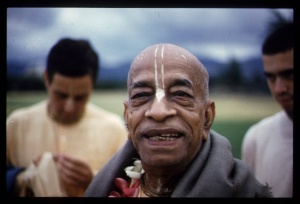SB 7.5.4: Difference between revisions
No edit summary |
(Vanibot #0054 edit - transform synonyms into clickable links, which search similar occurrences) |
||
| Line 23: | Line 23: | ||
<div class="synonyms"> | <div class="synonyms"> | ||
''ekadā'' | ''[//vanipedia.org/wiki/Special:VaniSearch?s=ekadā&tab=syno_o&ds=1 ekadā]'' — once upon a time; ''[//vanipedia.org/wiki/Special:VaniSearch?s=asura&tab=syno_o&ds=1 asura]-[//vanipedia.org/wiki/Special:VaniSearch?s=rāṭ&tab=syno_o&ds=1 rāṭ]'' — the Emperor of the asuras; ''[//vanipedia.org/wiki/Special:VaniSearch?s=putram&tab=syno_o&ds=1 putram]'' — his son; ''[//vanipedia.org/wiki/Special:VaniSearch?s=aṅkam&tab=syno_o&ds=1 aṅkam]'' — on the lap; ''[//vanipedia.org/wiki/Special:VaniSearch?s=āropya&tab=syno_o&ds=1 āropya]'' — placing; ''[//vanipedia.org/wiki/Special:VaniSearch?s=pāṇḍava&tab=syno_o&ds=1 pāṇḍava]'' — O Mahārāja Yudhiṣṭhira; ''[//vanipedia.org/wiki/Special:VaniSearch?s=papraccha&tab=syno_o&ds=1 papraccha]'' — inquired; ''[//vanipedia.org/wiki/Special:VaniSearch?s=kathyatām&tab=syno_o&ds=1 kathyatām]'' — let it be told; ''[//vanipedia.org/wiki/Special:VaniSearch?s=vatsa&tab=syno_o&ds=1 vatsa]'' — my dear son; ''[//vanipedia.org/wiki/Special:VaniSearch?s=manyate&tab=syno_o&ds=1 manyate]'' — considers; ''[//vanipedia.org/wiki/Special:VaniSearch?s=sādhu&tab=syno_o&ds=1 sādhu]'' — the best; ''[//vanipedia.org/wiki/Special:VaniSearch?s=yat&tab=syno_o&ds=1 yat]'' — that which; ''[//vanipedia.org/wiki/Special:VaniSearch?s=bhavān&tab=syno_o&ds=1 bhavān]'' — your good self. | ||
</div> | </div> | ||
Latest revision as of 23:03, 18 February 2024

A.C. Bhaktivedanta Swami Prabhupada
TEXT 4
- ekadāsura-rāṭ putram
- aṅkam āropya pāṇḍava
- papraccha kathyatāṁ vatsa
- manyate sādhu yad bhavān
SYNONYMS
ekadā — once upon a time; asura-rāṭ — the Emperor of the asuras; putram — his son; aṅkam — on the lap; āropya — placing; pāṇḍava — O Mahārāja Yudhiṣṭhira; papraccha — inquired; kathyatām — let it be told; vatsa — my dear son; manyate — considers; sādhu — the best; yat — that which; bhavān — your good self.
TRANSLATION
My dear King Yudhiṣṭhira, once upon a time the King of the demons, Hiraṇyakaśipu, took his son Prahlāda on his lap and very affectionately inquired: My dear son, please let me know what you think is the best of all the subjects you have studied from your teachers.
PURPORT
Hiraṇyakaśipu did not ask his young son anything that would be very difficult for him to answer; instead, he gave the boy a chance to speak plainly about whatever he thought might be best. Prahlāda Mahārāja, of course, being a perfect devotee, knew everything and could say what the best part of life is. In the Vedas it is said, yasmin vijñāte samam evaṁ vijñātaṁ bhavati: if one properly understands God, he can understand any subject matter very nicely. Sometimes we have to challenge big scientists and philosophers, but by the grace of Kṛṣṇa we emerge successful. It is impossible, practically speaking, for ordinary men to challenge scientists or philosophers concerning genuine knowledge, but a devotee can challenge them because the best of everything is known to a devotee by the grace of Kṛṣṇa. As confirmed in Bhagavad-gītā (BG 10.11):
- teṣām evānukampārtham
- aham ajñāna-jaṁ tamaḥ
- nāśayāmy ātma-bhāva-stho
- jñāna-dīpena bhāsvatā
Kṛṣṇa, who is situated in the core of everyone's heart as the Supersoul, dissipates all the ignorance from the heart of a devotee. As a special favor, He enlightens the devotee with all knowledge by putting before him the torch of light. Prahlāda Mahārāja, therefore, knew the best of knowledge, and when his father inquired from him, Prahlāda gave him that knowledge. Prahlāda Mahārāja was able to solve the most difficult parts of problems because of his advanced Kṛṣṇa consciousness. Therefore he replied as follows.